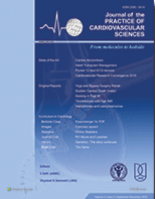
Journal of the Practice of Cardiovascular Sciences
Scope & Guideline
Innovating Solutions in Cardiovascular Health
Introduction
Aims and Scopes
- Clinical Cardiology and Patient Management:
This area focuses on the management of cardiovascular diseases through clinical studies, expert opinions, and real-world evidence, emphasizing treatment strategies, pharmacological management, and patient outcomes. - Innovations in Cardiovascular Interventions:
The journal regularly publishes research on novel surgical techniques, procedural innovations, and the application of advanced technologies in interventional cardiology, highlighting the evolution of treatment methods. - Epidemiology and Public Health:
Research addressing the epidemiology of cardiovascular diseases, risk factors, and public health strategies to combat noncommunicable diseases is a core focus, providing insights into population health. - Pathophysiology and Biomarkers:
Investigations into the underlying mechanisms of cardiovascular diseases and the identification of prognostic biomarkers are key areas, aimed at enhancing understanding and improving diagnostic accuracy. - Impact of Comorbidities and Special Populations:
The journal addresses the intersection of cardiovascular diseases with other health conditions, including diabetes, obesity, and infectious diseases, focusing on how these interactions affect patient care and outcomes. - Global and Regional Perspectives:
The journal emphasizes research that reflects regional health challenges and practices, particularly studies from India, contributing to a more diverse understanding of cardiovascular health.
Trending and Emerging
- COVID-19 and Cardiovascular Implications:
A significant increase in research related to the impact of COVID-19 on cardiovascular health has emerged, highlighting the interplay between infectious diseases and cardiac conditions. - Psychological and Behavioral Aspects of Cardiology:
There is a growing focus on the psychological aspects of cardiovascular health, including stress, mental health, and their effects on cardiac outcomes, reflecting a broader understanding of patient well-being. - Real-world Evidence and Observational Studies:
The trend towards real-world evidence and observational studies is gaining traction, with researchers increasingly focusing on practical outcomes and experiences of patients in diverse healthcare settings. - Advanced Imaging and Diagnostic Techniques:
Emerging technologies in imaging and diagnostics, including multimodal imaging and novel biomarkers, are becoming a focal point, enabling better assessment and management of cardiovascular diseases. - Personalized and Precision Medicine:
The journal is reflecting a shift towards personalized treatment approaches, with research exploring tailored interventions based on genetic, environmental, and lifestyle factors.
Declining or Waning
- Traditional Risk Factor Research:
While still relevant, there is a noticeable decline in publications focused solely on traditional cardiovascular risk factors (e.g., hypertension, hyperlipidemia), as newer studies tend to incorporate a more holistic approach involving multiple comorbidities. - Basic Science Research:
There has been a waning interest in purely basic science research related to cardiovascular diseases. The journal's recent publications lean more towards clinical applications and patient-centered research. - Standardized Treatment Protocols:
Research centered around established treatment protocols is becoming less frequent, likely due to the shift towards personalized medicine and individualized patient care based on specific clinical characteristics. - Outdated Surgical Techniques:
There appears to be a decline in the publication of studies focused on older surgical techniques, as the field moves towards innovative and less invasive procedures.
Similar Journals

International Journal of Cardiology Cardiovascular Risk and Prevention
Fostering Global Collaboration in Cardiovascular ResearchInternational Journal of Cardiology Cardiovascular Risk and Prevention is a distinguished Open Access journal published by ELSEVIER, dedicated to advancing research in the realms of cardiology and cardiovascular medicine. With an ISSN of 2772-4875 and based in the Netherlands, this journal has rapidly established itself as a critical resource for academics and practitioners since its inception in 2021. The journal currently holds a respectable impact factor and occupies the Q2 quartile in both Cardiology and Cardiovascular Medicine and Internal Medicine categories, reflecting its commitment to sharing high-quality research. Researchers can take advantage of its open-access model, ensuring that cutting-edge findings are freely available to a global audience. The journal not only covers innovative studies on cardiovascular risk factors and prevention strategies but also aims to facilitate interdisciplinary collaboration. With an ongoing trajectory from 2021 to 2024, the International Journal of Cardiology Cardiovascular Risk and Prevention is poised to remain a pivotal platform for dialogue and discovery in the evolving landscape of cardiovascular health.
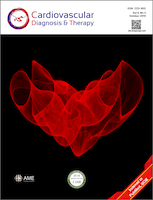
Cardiovascular Diagnosis and Therapy
Empowering Practitioners with Essential Cardiovascular KnowledgeCardiovascular Diagnosis and Therapy, an esteemed journal in the field of Cardiology and Cardiovascular Medicine, is published by AME PUBLISHING COMPANY, based in Hong Kong, China. With an ISSN of 2223-3652 and an E-ISSN of 2223-3660, this open-access journal aims to present cutting-edge research that significantly advances diagnostic and therapeutic practices in cardiovascular health. Recognized for its impact, it holds a 2023 category quartile ranking of Q2 and is positioned at rank #124 out of 387 in Scopus, reflecting its noteworthy contribution to medical literature with a percentile of 68th. The journal welcomes contributions that span various aspects of cardiovascular research, including clinical trials, epidemiological studies, and innovative therapeutic approaches, making it a vital resource for researchers, practitioners, and students alike, committed to improving cardiovascular care.
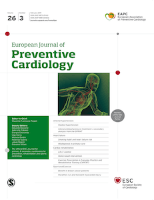
European Journal of Preventive Cardiology
Elevating knowledge in cardiovascular disease prevention.The European Journal of Preventive Cardiology, published by Oxford University Press, is a leading international journal dedicated to the field of cardiology and cardiovascular medicine. With an impact factor that underscores its prestige—ranking in the top quartile (Q1) of both cardiology and epidemiology categories—the journal serves as a critical resource for researchers and practitioners seeking to advance their understanding of preventive strategies in cardiovascular health. Since its inception in 1999, it has provided a platform for high-quality research and reviews that address the epidemiology of cardiovascular diseases, risk factor management, and innovative prevention methodologies. Notably, it currently ranks #21 out of 387 in Medicine - Cardiology and #13 out of 148 in Medicine - Epidemiology according to Scopus, highlighting its influential position in these essential biomedical fields. The journal also provides open access options, allowing both readers and authors the opportunity to engage with groundbreaking research and enhance the dissemination of knowledge. With a commitment to excellence, the European Journal of Preventive Cardiology is an invaluable asset for those dedicated to the prevention of cardiovascular diseases.
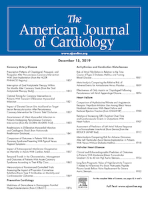
AMERICAN JOURNAL OF CARDIOLOGY
Driving Innovation in Heart Health and Clinical OutcomesThe American Journal of Cardiology is a leading peer-reviewed journal in the field of Cardiology and Cardiovascular Medicine, published by Excerpta Medica Inc-Elsevier Science Inc. Since its inception in 1958, the journal has consistently contributed to the advancement of cardiovascular research, providing a platform for groundbreaking studies and clinical findings that shape modern medical practices. With an impressive impact factor placing it in the Q1 category in its field for 2023, it ranks among the top journals in medicine, with a rank of #155 out of 387 in the Scopus database, reflecting its significance and rigorous editorial standards. The journal is committed to disseminating high-quality research that fosters innovation and enhances clinical outcomes in cardiology. Although it does not provide Open Access options, the American Journal of Cardiology remains an essential resource for researchers, healthcare professionals, and students looking to deepen their understanding of cardiovascular health.
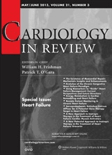
Cardiology in Review
Bridging research and practice in cardiology.Cardiology in Review, published by Lippincott Williams & Wilkins, is a prominent journal focused on advancing the field of cardiology and cardiovascular medicine. With a history of publication spanning from 1995 to 2024, the journal serves as an essential resource for researchers, healthcare professionals, and students alike, offering in-depth reviews and analyses on the latest developments, clinical practices, and research findings in cardiology. Despite being a traditional print journal, it maintains a commendable Q2 ranking in both cardiology and miscellaneous medicine categories as of 2023, reflecting its influence and rigor in the academic community, with a Scopus rank of #132 out of 387 in its field, placing it in the 66th percentile. The journal aims to bridge the gap between clinical practice and emerging research, promoting a deeper understanding and integration of innovative strategies in cardiovascular care. With its commitment to high-quality scholarship, Cardiology in Review remains a vital conduit for knowledge and dialogue within the evolving landscape of cardiovascular health.

REVISTA ESPANOLA DE CARDIOLOGIA
Championing Innovation in Cardiac CareREVISTA ESPANOLA DE CARDIOLOGIA is a premier journal dedicated to the dynamic field of cardiology, published by EDICIONES DOYMA S A in Barcelona, Spain. With an impressive Q1 status in the Medicine (miscellaneous) category for 2023, this journal is recognized for its significant contributions to cardiovascular research, evidenced by its rank of #61 out of 387 in the Scopus database, placing it within the top 16% of journals in its field. Covering a broad range of topics within cardiology, the journal aims to disseminate high-quality research, clinical studies, and educational content, fostering knowledge sharing among researchers, clinicians, and students alike. While it does not currently offer open access, the journal maintains a commitment to advancing cardiovascular health through rigorous peer-reviewed articles. With a publication history that spans from 2013 to 2024, REVISTA ESPANOLA DE CARDIOLOGIA is an essential resource for those seeking to stay at the forefront of cardiology advancements and practices.

International Cardiovascular Research Journal
Fostering collaboration for breakthroughs in heart science.International Cardiovascular Research Journal, published by Shiraz University Medical Sciences, serves as a vital platform for the dissemination of cutting-edge research in the field of cardiology and cardiovascular medicine. Since its inception in 2011, this journal has continuously devoted itself to promoting the highest quality of scholarly communication, helping to bridge the gap between laboratory findings and clinical application. With an ISSN of 2251-9130 and an E-ISSN of 2251-9149, it is indexed in prominent databases, contributing to its visibility and accessibility to a global audience. Although currently classified in the Q4 quartile in the 2023 rankings, the journal is committed to enhancing its impact factor and academic stature. It aims to facilitate open access for all published articles, although specific details on access options are pending. Through its rigorous peer-review process and diverse scope—which encapsulates advancements, clinical studies, and innovative therapeutic strategies—this journal fosters academic collaboration in the realm of cardiovascular health, making it an invaluable resource for researchers, practitioners, and students alike.
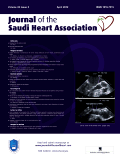
Journal of the Saudi Heart Association
Championing Open Access to Cardiovascular ResearchThe Journal of the Saudi Heart Association is a prominent scholarly publication dedicated to advancing knowledge in the fields of cardiology and cardiovascular medicine. Published by DIGITAL COMMONS BEPRESS, this open-access journal has been serving the global community since 2009, providing a vital platform for researchers, practitioners, and students interested in the latest developments in heart health and disease management. With an ISSN of 1016-7315 and a growing repository of knowledge alongside an E-ISSN of 2212-5043, the journal showcases an array of peer-reviewed articles that contribute to the understanding of cardiovascular conditions. Although categorized in the Q4 quartile for 2023, it remains committed to offering valuable insights, particularly within the constraints of the 29th percentile rank specified by Scopus. As the journal converges towards 2024, it continues to foster collaboration, innovation, and inquiry within the Saudi Arabian and international medical communities.

Journal of Cardiology
Elevating understanding of cardiovascular diseases globally.Journal of Cardiology, published by ELSEVIER, stands as a prominent resource in the field of cardiology and cardiovascular medicine. With a rich history since its inception in 1987, this peer-reviewed journal aims to disseminate cutting-edge research that enhances the understanding and treatment of cardiovascular diseases. Its 2023 ranking places it in the Q2 category within its discipline, reflecting its significance and impact, as evidenced by a Scopus rank of #123 out of 387 journals, positioning it in the 68th percentile of its field. The journal is headquartered in Japan, providing a unique perspective on cardiological advances relevant not only to the Asian continent but also globally. Though it does not currently offer open access, the Journal of Cardiology remains a vital institutional resource for researchers, clinicians, and students seeking to push the boundaries of cardiovascular science and improve patient outcomes.

Cardiology Journal
Exploring the future of cardiac science.Cardiology Journal, published by VIA MEDICA, stands as a prominent resource in the field of cardiology and cardiovascular medicine, with an ISSN of 1897-5593 and an E-ISSN of 1898-018X. Recognized for its Open Access model established since 1994, this journal facilitates widespread dissemination of critical research findings, allowing practitioners and researchers globally to access valuable insights without barriers. Based in Poland, with an address at UL SWIETOKRZYSKA 73, 80-180 GDANSK, it has achieved a respectable Q2 classification in 2023 for both Cardiology and Miscellaneous Medicine categories, reflecting its influence and quality within the scholarly community. With a Scopus ranking placing it at #117 out of 387 in Cardiology, it lies within the 69th percentile, underpinning its commitment to advancing knowledge in cardiovascular health. The journal’s converged years extending from 2006 to 2024 ensure it captures ongoing developments in a rapidly evolving field. As such, the Cardiology Journal serves as an indispensable platform for researchers, professionals, and students dedicated to exploring the frontiers of cardiac science and improving patient care.